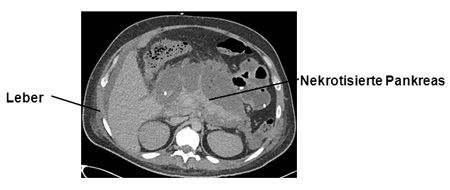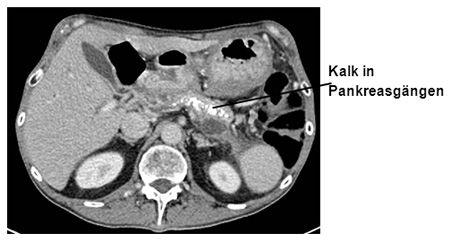Treatment options
The following treatment options are available for pancreatitis:
- Mild pancreatitis: Under conservative treatment with painkillers, mild pancreatitis, which is the most common type (80%), heals completely within a few days. As a rule, no special diagnostic and therapeutic interventions are required. However, it is important to find the cause of the pancreatitis. The most common causes are alcohol and gallstones. Other less common causes may be hyperlipidemia or a pancreatic tumor. However, if gallstones are the cause of mild pancreatitis, the gallbladder as the reservoir for the gallstones must be removed in order to prevent further inflammation. This operation is performed laparoscopically once the acute inflammatory reaction has subsided. However, it may also be carried out during the same inpatient stay.
- Severe pancreatitis: Patients with severe pancreatitis often require intensive medical treatment to monitor and treat the various organ dysfunctions. Repeated X-ray and laboratory examinations, antibiotics and artificial nutrition are necessary. If gallstones are the cause, an ERCP examination is performed. The pancreatic tissue destroyed by the inflammation has a high infection rate. This infected tissue can be the starting point for sepsis, so that it must be removed by surgery (“necrosectomy”). Despite the best possible treatment methods available today, patients can still die from severe acute pancreatitis.

Computer tomography (CT) of severe necrotizing pancreatitis
- Conservative therapy: Chronic pancreatitis is mainly treated with conservative medication. The most important measure is to give up alcohol and tobacco completely. As practically all patients, without exception, experience severe to very severe pain, good and adequate pain therapy is of great importance. Blood sugar control and the replacement of digestive enzymes with medication are further therapeutic approaches.

Computer tomography (CT) of chronic calcifying pancreatitis
- Surgical therapy: As a result of the increasing scarring of the pancreas, the common bile duct and the pancreatic duct as well as the duodenum (duodenum) can become narrowed. In these cases, Whipple surgery or a duodenum-preserving pancreatic head resection may be necessary. If large cysts have formed in the pancreas as a result of repeated episodes of inflammation, these can be drained by drainage surgery, as can an isolated blocked pancreatic duct.

